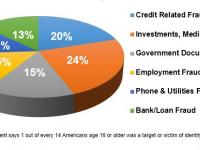5 Signs You May Be a Victim of Identity Theft
Data breaches are the new normal and it’s likely to get worse as hackers get smarter. Every year millions of records are compromised. “That means everyone in this country should assume that their personal information has already been compromised,” said Robert Sicilano, identify theft expert at BestIDTheftCompanys.com.
Most people find out they’ve been victimized when they are contacted by their financial institution. Fraud experts say we can’t rely on someone else to catch the problem — we must take steps to protect ourselves. It’s important to constantly be on the lookout for warning signs that your personal information has been stolen and is being used.
Here are some key warning signs that you’ve been a victim of identity theft:
1. Your credit card gets declined for an unknown reason. You’re at the checkout and your card gets declined, don’t assume it’s the stores fault for not taking your plastic. Go home and check your account immediately. If your funds are intact, call your issuer to see if they can help you get to the bottom of what may have caused the transaction to fail.
2. Mystery charges appear on your credit or debit card statements. Do not ignore any smaller charges that you didn’t make. Hackers may first make a small purchase ($5-$10) as a test. If those purchase go through unnoticed, they will continue to make larger purchases or even max out your credit card.
3. A new credit card or store charge card show up that you didn’t apply for. Do not assume this is a mistake and call the company immediately. Your personal information may have been used to apply for this card.
4. You have good credit, but an application for credit is denied. If you know your credit score is strong, but you’re denied a loan or credit, then an identity theft could have messed up your credit file and ruined your credit score.
5. Missing mail or strange email, especially from your financial institution. A thief may have filed for an address change in order for you to miss the changes on your account. Another form of stealing personal information is through email. If your friends receive an email from you saying you’re in another country and need money wired then someone has hacked in to your email. Change your password immediately.
Most importantly, take ten minutes out of your time to follow-up on something that seems out of the ordinary with any accounts that handle your personal information. You can save yourself a lot of hassle in the long run if there is a real trouble.
This is Part 1 of a 3 part series over Identity theft. Please check back next Friday for Part 2, Three Things To Do if Your Identity Has Been Compromised.




